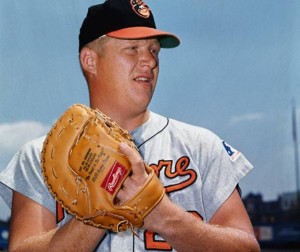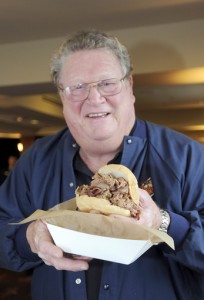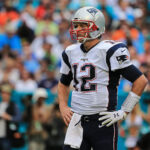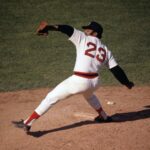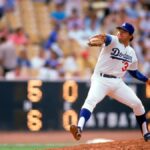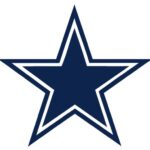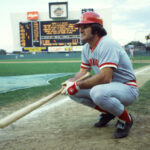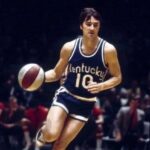Happy 70th Birthday Boog Powell!
The Baltimore Orioles of the 1960s and early 1970s boasted a roster busting with stars from top to bottom. While Brooks and Frank Robinson were the two best players on the team, the most imposing figure was a 6-foot-4, 240 pound first baseman who hit towering home runs and picked throws out of the dirt with ease. It was that player, Boog Powell, who became a favorite to many young fans, including myself.
It is hard to believe that today is the 70th birthday for one of the great sluggers of his era and we at Sports Then and Now want to wish a Happy Birthday to one of our all-time favorite players.
Given the super-sizing of professional baseball players in recent years, Powell’s size may no longer seem all that special, but in the 1960s and 1970 when most players were shaped like string beans, Powell was hard to miss. With tree trunks for arms that looked even larger when wearing the Orioles tight fitting gray uniform top, he spent more than a decade launching mammoth home runs and playing first base for the Baltimore Orioles.
A fair-skinned giant with reddish hair, Powell looked like a farm boy from the Midwest, but actually was born in Lakeland, Florida and grew up in the Sunshine State. Though his given name was John Wesley Powell, he earned the nickname “Boog” as a kid due to his mischievous nature. He seemed to always be getting into something and became known as Booger, as in, “What’s that little Booger doing now?” The nickname was eventually shortened to Boog, probably around the time he got big enough to beat the snot out of anyone who would dare call him Booger.
Powell’s prowess on the baseball field was evident from an early age. In 1954 he was part of the Lakeland Little League squad that played in the Little League World Series in Williamsport, Pennsylvania.
Signed as a free agent by the Baltimore Orioles in 1959, Powell quickly made his way to the majors. He led the International League in home runs in 1961 and made his major league debut that September.
The next season he became the starting leftfielder for the Birds and was an important reason the Orioles were steadily moving from perennial doormat to contender in the American League. Powell blasted 25 home runs in 1963 and the following season hit 39 homers and led the American League with a .606 slugging percentage despite missing several weeks with a broken wrist.
In 1965 Powell moved to first base and for the next decade his soft hands helped make infielders Davey Johnson, Mark Belanger, Luis Aparicio, Bobby Grich and Brooks Robinson regular Gold Glove recipients. Despite the presence of so many Gold Glovers in the Orioles infield, and the fact that Powell posted a better fielding percentage than the league’s Gold Glove first baseman on several occasions, he never won a Gold Glove.
The 1966 season proved to be a breakout year for Powell and the Orioles. Baltimore won the American League Pennant for the first time and then defeated the Los Angeles Dodgers to claim the World Series title. Powell finished third in the voting for Most Valuable Player, behind teammates Frank Robinson and Brooks Robinson, after hitting 34 home runs and driving in 109 runs.
Injuries hampered Powell and the entire Orioles team the next two seasons, but they rebounded in 1969. Baltimore led the league with 109 victories and Powell finished second in the American League MVP voting after hitting .304 with 37 home runs and 121 RBIs. Baltimore lost the World Series in five games to the New York Mets.
The following season, Powell finally earned the AL MVP Award with another productive season. The Orioles also won the World Series in five games over the Cincinnati Reds. The lasting memory of the 1970 World Series is the stellar play of third baseman Brooks Robinson, but Powell also had a pretty good series hitting .294 with two home runs and driving in five runs.
Baltimore returned to the World Series in 1971, losing to the Pittsburgh Pirates in seven games, but Powell struggled with injuries during the season and his productivity started to decrease. He followed up seasons of 22 and 21 home runs in 1971 and 1972 respectively by hitting a combined total of only 23 home runs during the 1973 and 1974 seasons. The Birds won division crowns in both 1973 and 1974, but Powell was no longer an everyday starter.
The Orioles parted ways with their popular first baseman following the 1974 season as he was traded to Cleveland for journeyman catcher Dave Duncan. The move reinvigorated Powell as he was reunited with his former teammate Frank Robinson, who was the player-manager for the Indians. Returning to the everyday lineup for the first time in three years, Powell responded with his best season since winning the MVP Award. He hit .297 with 27 home runs and 86 runs batted in while finishing third in the league in slugging percentage.
That proved to be Powell’s final productive season as he hit only nine home runs during the 1976 season before being released by the Indians during the 1977 spring training. He latched on with the Los Angeles Dodgers for much of the 1977 season, but with no designated hitter in the National League and Steve Garvey firmly planted at first base, Powell was relegated to a role as a left-handed pinch hitter. He struggled in this new position and was released late in the season.
While Powell’s play on the field was outstanding, the key to his great popularity was his status as a “gentle giant” of the game. Known for his sense of humor and fan-friendly attitude, Powell was a beloved figure in Baltimore and across baseball. That larger-than-life personality made Powell a popular figure in a number of Miller Lite television commercials following his retirement. When the Orioles opened their new Orioles Park at Camden Yard in 1992, it made perfect sense that Powell would play an important role in setting the atmosphere of baseball’s best park. A trip to the stadium isn’t complete without a visit to “Boog’s Barbeque.”
Though his career numbers (339 home runs, 1187 RBIs, .266 batting average) aren’t worthy of consideration for the Baseball Hall of Fame, the accomplishments and personality of Boog Powell should never be forgotten.
Even though the Orioles aren’t in town to celebrate his milestone birthday, here’s hoping that it is a great day for one of the greatest Orioles of all-time.
